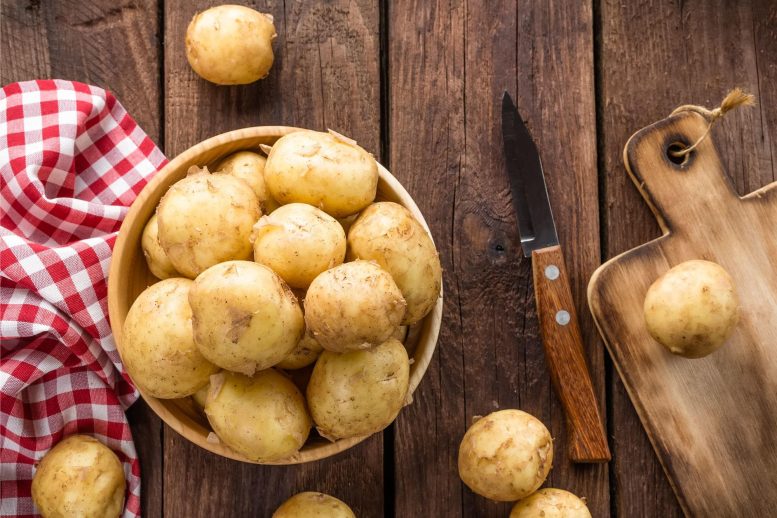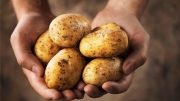
Potatoes are a type of root vegetable native to South America. They are a staple food in many parts of the world and are highly nutritious, providing a good source of vitamins, minerals, and fiber. Potatoes are low in calories and contain no fat, making them a popular choice for weight loss and healthy eating. They are also a good source of complex carbohydrates, which provide a slow and sustained release of energy. However, the way in which potatoes are prepared can greatly affect their nutritional value.
While they may not have all the benefits of other vegetables, potatoes can still be a healthy choice if prepared correctly.
In recent years, low or no-carbohydrate diets have become popular, leading to the potato being overlooked in favor of other vegetables.
In fact, research has suggested that potatoes may have a negative impact on health, including an increased risk of developing Type 2 diabetes.
However, new Edith Cowan University (ECU) research has shown while spuds may not have all the same benefits as some other vegetables — such as lowering the risk of Type 2 diabetes — health issues associated with potatoes may actually be due to how people are preparing them and what they’re eating them with.
More than 54,000 people reported their dietary intake for the long-term Danish Diet, Cancer, and Health study.
A recent analysis of this study led by Dr. Nicola Bondonno from ECU’s Nutrition and Health Innovation Research Institute found people who consumed the most vegetables were 21 percent less likely to develop Type 2 diabetes than those who consumed the least amount of vegetables.
Ph.D. candidate Pratik Pokharel carried out work on the analysis and said while potatoes didn’t have the same impact on Type 2 diabetes, they also didn’t have any negative effect.
“In previous studies, potatoes have been positively linked to the incidence of diabetes, regardless of how they’re prepared — but we found that’s not true,” Mr. Pokharel said.
“In Denmark, people consume potatoes prepared in many different ways; in our study, we could distinguish between the different preparation methods. When we separated boiled potatoes from mashed potatoes, fries or crisps, boiled potatoes were no longer associated with a higher risk of diabetes: they had a null effect.”
Mr. Pokharel said underlying dietary patterns were the key.
“In our study, people who ate the most potatoes also consumed more butter, red meat, and soft drink — foods that are known to increase your risk of Type 2 diabetes,” he said.
“When you account for that, boiled potatoes are no longer associated with diabetes. It’s only fries and mashed potatoes, the latter likely because it is usually made with butter, cream, and the like.”
Eat your vegetables
Mr. Pokharel said findings from the study indicate vegetables could play a key role in reducing Type 2 diabetes, as people who ate a lot of leafy greens and cruciferous veggies such as spinach, lettuce, broccoli and cauliflower had a significantly lower risk of developing the condition.
He said the relationship between vegetables and diabetes should be incorporated into public dietary guidelines — as should the benefits of eating potatoes.
“The finding that vegetables lower diabetes risk is crucial for public health recommendations, and we shouldn’t ignore it,” he said.
“Regarding potatoes, we can’t say they have a benefit in terms of type 2 diabetes, but they also aren’t bad if prepared in a healthy way. We should separate potatoes and other vegetables in regard to messaging about disease prevention but replacing refined grains such as white rice and pasta with potatoes can improve your diet quality because of fiber and other nutrients found in potatoes.”
Putting it into practice in the kitchen
Mr. Pokharel said people should be advised to increase their vegetable intake — and they could include potatoes, so long as they left out some of the unhealthy extras such as butter, cream, and oil.
“Potatoes have fiber and nutrients, which are good for you,” he said.
“People talk about carbs being bad, but it’s more about the type of carbs you’re having; compared to something like white rice, boiled potatoes are a good quality of carbohydrate. But just be careful of how you prepare them: don’t eat fries or mash with extras in it all the time. Just boil them and eat them like other greens or other foods — and you don’t need to have it with red meat all the time.”
Reference: “Vegetable, But Not Potato, Intake is Associated With a Lower Risk of Type 2 Diabetes in the Danish Diet, Cancer and Health Cohort” by Pratik Pokharel, Cecilie Kyrø, Anja Olsen, Anne Tjønneland, Kevin Murray, Lauren C. Blekkenhorst, Catherine P. Bondonno, Jonathan M. Hodgson and Nicola P. Bondonno, 5 December 2022, Diabetes Care.
DOI: 10.2337/dc22-0974









You do not mention baked potatoes! Why?
I suspect that more nutrients of baked potatoes break down faster under the high temps of baking than with boiling, which occurs with any plant-based food. With boiling, the potatoes do not exceed the temperature of the boiling point temperature of the water they are boiling in. With frying, temps are very high and also add fat. Notice also the article does not mention steaming potatoes (or vegetables), since steam is at a higher temperature than boiling water.
Mencionou batatas puras – feitas de qualquer forma.